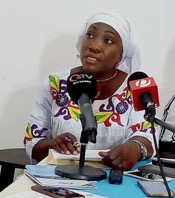
The ministry in collaboration with the United Nations Environment Programme (UNEP) is currently implementing a project titled: ‘National framework for leapfrogging to energy efficient and climate-friendly air conditioners and refrigerators in The Gambia’. The project, which is funded by Green Climate Fund (GCF) is aimed at developing an integrated policy document that would culminate in a legislative framework for energy-efficient air conditioners and refrigerators in the country.
Speaking at the opening of the validation ceremony held at the Metzy Hotel, the permanent secretary at the Ministry of Petroleum and Energy, Amie Njie, stated that climate change and the deterioration of natural resources are intensifying levels of poverty, inequality and deprivation around the world. She added that challenges exist for vulnerable communities in least developing countries like The Gambia.
“As such, there is a need for a more climate-resilient development pathway. This is particularly important in The Gambia. As expressed in our National Determined Contribution (NDC), climate change, and more frequent and severe droughts pose serious risks to sustaining poverty reduction and broader development goals.”
She said most importantly, the low level of available climate finance to address these issues has proven to be a challenge. PS Njie went on to say that in response to this pressing need for inclusive climate finance, the GCF which is financing the readiness project was established as an operating entity of the financial mechanism of the United Nations Framework Convention on Climate Change (UNFCCC) in 2010.
She further highlighted that its key purpose within the context of sustainable development is to help finance the paradigm shift towards low-emission and climate-resilient pathways to help limit or reduce greenhouse gas emissions and adapt to the unavoidable impacts of climate change. She added that the fund finances programmes and projects that address climate change and build climate resilience around the world, especially in developing countries.
“This resilience cooling project aims to develop an integrated policy strategy that results in a comprehensive legislative framework for energy-efficient air conditioners and refrigerators in the country that will ultimately reduce greenhouse gas emissions.”
She further explained that the validation targeted key stakeholders on energy-efficient air conditioners and refrigerators, thus geared to present the results of the market assessment recently conducted on the usage of ACs and refrigerators in the country.
Read Other Articles In Headlines





